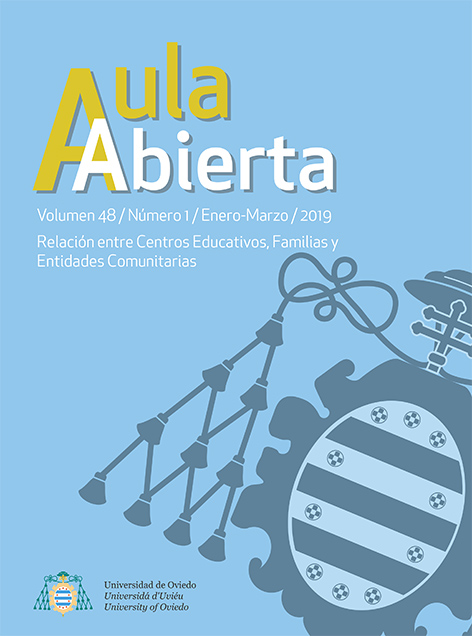Resumen
Teachers’ and trainee teachers’ beliefs have been capturing the attention of researchers for the last few decades but beliefs about family-school relationships are not often addressed. In this study, participants were 133 teachers and 194 trainee teachers. Our aim was to compare their beliefs about family-school relationships and their self-efficacy to relate with families. We used the Beliefs about Family-School Relationships questionnaire comprised of 22 items that explore beliefs about collaboration, subordination (families should accept the teacher’s authority), delegation (families leaving education to the professionals), and self-efficacy to relate with families. Teachers and trainee teachers felt highly able to relate with families and support collaboration beliefs. Beliefs did not change with years of professional practice and training but there were intra and intergroup differences. Trainee teachers believed more in collaboration than qualified teachers did, and preschool teachers and trainee teachers believed more in collaboration and less in subordination and delegation compared to primary teachers and trainee teachers. These results have implications for teachers’ training and practice as the emphasis in collaboration is pervasive in policies and guidelines to relate with families.
Citas
Amatea, E. S. (2009). From separation to collaboration. The changing paradigm of family-school relations. In E.S. Amatea, Building Culturally Responsive Family School Relationships (pp. 19-50). Boston, MA: Pearson.
Amatea, E.S., Mixon, K., & McCarthy, S. (2012). Preparing Future Teachers to Collaborate With Families. Contributions of Family Systems Counselors to a Teacher Preparation Program. The Family Journal: Counseling and Therapy for Couples and Families, 21(2), 136-145. doi: https://doi.org/10.1177/1066480712466539
Ashton, P.T. (2015). Historical overview and theoretical perspectives of research on teachers’ beliefs. In H. Fives & M.G. Gill, International Handbook of research on teachers’ beliefs (pp. 31- 47). New York: Routledge.
Bandura, A. (1986). Social Foundations of Thought and Action: a social cognitive theory. Englewood Cliffs, New Jersey: Prentice-Hall.
BOE (2013). Ley Orgánica 8/2013, de 9 de diciembre, para la mejora de la calidad educativa.
Buhel, M.M., & Beck, J.S. (2015). The relationship between teachers’ beliefs and teachers’ practices. In H. Fives & M.G. Gill, International Handbook of research on teachers’ beliefs (pp.66- 84). New York: Routledge.
Cagigal de Gregorio, V. (2005). Trabajar con las familias en el contexto escolar. In V. Cagigal de Gregorio (comp.), Construyendo puentes: claves de colaboración escuela-familia ante los problemas de conducta (pp. 9-50). Madrid: PPC.
Christenson, S.L., & Sheridan, S.M. (2001). Schools and families. New York: Guildford Press.
Collier, M., Keefe, E.B., & Hirrel, L.A. (2015). Preparing Special Education Teachers to Collaborate With Families. School Community Journal, 25, 117-135.
García, D.C. (2004). Exploring connections between the construct of teacher efficacy and family involvement practices. Implications for urban teacher preparation. Urban Education, 39(3), 290-315. doi: https://doi.org/10.1177/0042085904263205
García-Bacete, F.J. (2006). Cómo son y cómo podrían ser las relaciones entre escuelas y familias en opinión del profesorado. Cultura y Educación, 18(3-4), 247-265. doi: http://dx.doi.org/10.1174/113564006779173000
García-Bacete, F.J. & Martínez-González, R.A. (2006). La relación entre los centros escolares, las familias y los entornos comunitarios como factor de calidad de la educación de menores y adultos. Cultura y Educación, 18(3-4), 213-218. doi: http://dx.doi.org/10.1174/113564006779173019
Gill, M.G., & Fives, H. (2015). Introduction. In H. Fives & M.G. Gill, International Handbook of research on teachers’ beliefs (pp.1-10). New York: Routledge.
Gomariz-Vicente, M. A., Hernández- Prados, M.A., García-Sanz, M.P., & Parra, J. (2017). Tejiendo puentes entre la escuela y la familia. El papel del profesorado. Bordón, 69 (2), 41-57. doi: https://doi.org/ 10.13042/Bordon.2016.49832
Hoffamn, B.H., & Seidel, K. (2015). Measuring teachers’ beliefs. In H. Fives & M.G. Gill, International Handbook of research on teachers’ beliefs (pp.106-127). New York: Routledge.
INE (2016). INE. Anuario estadístico de España. Recuperado de: http://www.ine.es/prodyser/pubweb/anuario16/anu16_03educa.pdf
Kennedy, H., Landor, M., & Todd, L. (2011). Video interaction guidance. A relationship-based intervention to promote attunement, empathy and well-being. London: Jessica Kingsley Publishers.
López-Larrosa, S. (2009). La relación familia-escuela. Guía práctica para profesionales. Madrid: CCS.
Martínez-González, R.A., y Pérez-Herrero, M.H. (2006). Propuestas metodológicas para una educación de calidad a través de las relaciones entre centros docentes, familias y entidades comunitarias. Cultura y Educación, 18(3-4), 231-246.
Moorman, E., Coutts, M. J., Holmes, S. R., Sheridan, S. M., Ransom, K. A., Sjuts, T. M., & Rispoli, K.M. (2012). Parent involvement and family-school partnerships: Examining the content, processes, and outcomes of structural versus relationship-based approaches (CYFS Working Paper No. 2012-6). Retrieved from the Nebraska Center for Research on Children, Youth, Families and Schools website: cyfs.unl.edu.
Nzinga-Johnson, S., Baker, J.A., & Aupperlee, J. (2009). Teacher-parent relationships and school involvement among racially and educationally diverse parents of kindergartners. The Elementary School Journal, 110, 81-91. doi: http://psycnet.apa.org/doi/10.1086/598844
Pajares, F. (1992). Teachers’ beliefs and educational research: cleaning up a messy construct. Review of Educational Research, 62(3), 307-332. doi: https://doi.org/10.3102/00346543062003307
Pang, I-W., & Watkins, D. (2000) Towards a Psychological Model of Teacher–Parent Communication in Hong Kong Primary Schools. Educational Studies, 26(2), 141-163. doi: https://doi.org/10.1080/713664272
Robledo, P., & García, J.N. (2007). El entorno parental en la intervención de personas con dificultades del desarrollo. In J.N. García (Coord.), Dificultades del desarrollo. Evaluación e intervención (pp. 307-316). Madrid: Pirámide.
Rodrigo, M.L., Martínez-González, R.A., & Rodríguez-Ruiz, B. (2018). La Relación Centro Escolar-Familia como Factor Protector de Conductas Transgresoras en la Adolescencia. Aula Abierta, 47(2), 149-158. doi: https://doi.org/10.17811/rifie.47.2.2018.149-158
Schraw, G., & Olafson, L. (2015). Assessing teacher’s beliefs. In H. Fives & M.G. Gill, International Handbook of research on teachers’ beliefs (pp.87-105). New York: Routledge.
Smith, N.T. (2012). What shapes middle school teachers’ abilities to build productive parent-teacher relationships? The roles of self-efficacy and teachers’ and principal’s role constructions. Doctoral dissertation, University of Southern California.
Valdemoros-San-Emeterio, M.A., & Lucas-Molina, B. (2014). Competencias que configuran el perfil del docente de primaria. Análisis de la opinión del alumnado de Grado en Educación Primaria. Aula Abierta, 42, 53-60. doi: https://doi.org/10.1016/S0210-2773(14)70009-5
Vázquez-Huertas, C., & López-Larrosa, S. (2014). Creencias sobre la relación familia-escuela. Cambios en el futuro profesorado tras recibir formación específica. Revista de Estudios e Investigación en Psicología y Educación, 1(2), 111-121. doi: http://dx.doi.org/10.17979/reipe.2014.1.2.35
Weiss, H.B., López, M.E., Kreider, H., & Chatman-Nelson, C. (2014, 3rd edition). Preparing educators to engage families. Thousand Oaks, CA: Sage.


